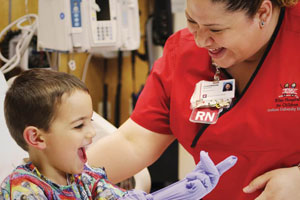
Our movement disorder services at Riley Children’s Health bring together experts from areas like orthopedics, neurology and neurosurgery. We work as a team to help children with conditions that impact body movements. Together, we offer support and treatment tailored to each child’s needs. Our goal is to help your child move better and feel more comfortable, so they can enjoy daily activities and life to the fullest.
What are movement disorders?
Movement disorders in children are common. They lead to decreased functional ability and discomfort. They are frequently caused by injuries to the brain and spinal cord, previous brain infections, genetic or metabolic conditions, and inflammatory or autoimmune disorders.
Signs and symptoms of movement disorders include delays in fine and gross motor skills, decreased range of motion in the arms or legs, inability to control movements in the limbs or trunk, and muscle “tightness” that causes discomfort.
Among the conditions we treat are:
- Spasticity and related complications such as muscle contractures
- Dystonia and dyskinesias
- Mixed movement disorders, commonly seen in conditions like cerebral palsy
- Neuromuscular disorders affecting muscle tone, coordination, and mobility
- Orthopedic complications resulting from neuromotor dysfunction
Non-surgical treatment options we offer
We offer several services for movement disorders and spasticity. Below are some, but not all, of the services that we provide. If you have a question about a specific service that is not listed here, please contact our program.
- Physical therapy services, including outpatient therapy or rehabilitation
- Motion analysis
- Serial casting
- Botox injections and phenol motor blocks
Surgical Treatment Options
We also offer surgical treatments for movement disorders and spasticity. If you have a question about a specific service that is not listed here, please contact our program. Learn more about our surgical spasticity program.
Conditions & Services
Services Offered
We offer a number of different Movement Disorders Services services. Below are some, but not all, of the services that we provide. If you have a question about a specific service that is not listed here, please contact our program.
Providers and Locations
Related Programs & Departments
Related Programs & Departments
We provide multispecialty care for a number of conditions. Below are links to our related programs & departments.
Health Professionals
For Health Professionals
Refer A Patient

Riley Children's works with referring physicians in Indiana and beyond. Providers can refer a patient online or contact us. Call our neurology team at 317.948.7450 or fax 317.968.1193.
Refer A Patient
